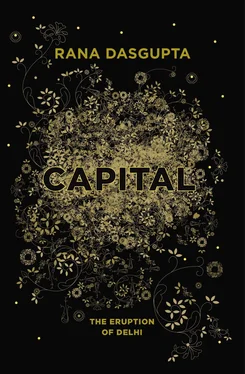“Currently we’re a 2,600-crore company and I’m aiming to double that in the next four years. That’s over a billion dollars. Do you realise what that means? It took us sixteen years to get to where we are, and I’m going to do the same again in four. Some of this will come from strategic acquisitions and the rest from organic growth — it’s all laid out in my medium-term plan.
“Two years from now I’m looking at 30 per cent of revenues from outside India. Right now it’s about 5 per cent. Because there’s so much growth in this market you don’t need to look outside. And we’re still preparing to have the kind of solid base we need to go global. It’s not so easy to go global. There are acquisition opportunities coming my way every day but, you know, the easiest thing to do is just take them and then later on you’ll get fucked. We’ll do it when we’re ready for it — we’re preparing to make acquisitions in the Middle East and Europe but only when we know it really makes sense.”
“Who owns your company?”
“Over a period of time it’s gone completely professionalised, we have a management board, supervisory board and all that. But ownership is very clear. The metals division, I own, 100 per cent. The interiors divisions, my dad owns. And the plan is that in two years the entire interiors division will come under my control. And I’ve made it very clear to my dad I don’t want any ambiguity or confusion. No one comes into my business for sure. Apart from that he can do whatever he wants to do.”
A man wanders out to the pool. Rakesh introduces his brother-in-law, who has pointed shoes on, a fresh shirt and a lot of gold. He is ready to hang out. His perfume outdoes the evening flowers. Through the window I can see uniformed waiters laying out dinner places for twelve at the long white table. Others have arrived and are drinking inside. It feels like a nightly ritual: I get the impression that a lot of people have the habit of ending their days here.
“In India, the good thing is, our fundamentals are strong. The only thing that will pull us down is the infrastructure and education. If it weren’t for the people who run our country, we would actually have children educated and roads built. And the corruption! You know these pollution inspectors? They can hold you to ransom. I’ve got nineteen manufacturing divisions. Even if every one of them conforms 100 per cent to the environmental regulations — they will still fuck you up the ass. And it’s serious. It’s really serious. They can seal your company and then you’re dead.
“Because I have to supply my customers every hour . No interruptions. I hold only three to four hours of inventory. And you know how many cars on an average I supply components for? Just have a guess. A wild guess. Daily. Okay, I’ll tell you. Five and a half thousand cars a day. Can you imagine the supply chain, the profit floor, the material floor…? The automotive segment teaches you to work with the highest levels of precision. You can’t fuck around with bad components of a car because people can die. You’ve got to be so accurate. I can’t tell my customers I met 99.9 per cent of their requirements. If bad components get to the field and there’s a recall, my entire group will be wiped out.”
“How did you learn to do all this?” I ask.
“Nearly everything I learned from Suzuki. That company for me is the best company in the world. Undoubtedly. Look at their systems, their processes, their people. The collaborative approach they have in managing their supply chain. It’s not: ‘You fucked up, so fuck off.’ If you fucked up, if you’re eager to learn, if you have that bent of mind where you accept that you’ve made a mistake but you’re open to them, they say: ‘We’ll teach you and we’ll be with you for life.’ That’s the kind of approach these guys have. That’s the Japanese approach.”
Rakesh has his eye on the friends arriving inside — some have wandered out to say “Wassup?” His staff come from time to time to consult him about logistics, and after each interruption he resumes his sentence where he left it. I imagine him efficient at work, moving rapidly and intently from task to task.
But he needs to join the party. We get up. The house is like a reality theatre: through the glass is an illuminated stage with characters in all sorts of costumes. At one end, friends recline in deep sofas, their Italian shoes twitching in the air, while at the other, a waiter in a white uniform floats fresh flowers in the marble fountain. Above his head are enormous chandeliers made of bright blue Murano glass.
“I have two lives,” says Rakesh, contemplating the view. “I have an automotive business, but I also have a real estate business. During the day I’m in fucking uniform. I have an open-door policy: can you imagine what that means in a 2,600-crore concern? But what you see in front of you is the wealth generated from my real estate. Not from my automotive business. Real estate is something that we’ve been investing in for a long while. Some inherited wealth, some great investments my dad made over a period of time, which went through the roof. Two lives. I don’t mix the two lives at all.”
He is proud of his house and wants to show off some highlights before I leave. It is clearly inspired by travels in five-star hotels. There is a massage room and a post-massage chill-out room . A beauty parlour. A teppanyaki restaurant.
He walks around quickly, pointing out details: “I knew from the beginning I wanted a water body near my dining table, which is why we have this fountain.” He is obsessed by small imperfections. He talks about the architect, with whom things ended acrimoniously — apparently because the architect presumed to have his own ideas: “Sometimes all you want from someone is to understand what’s inside your head and to get it out.” He is quick to explain, in case I should underestimate his vision, that what I see around me is not the final version. The ventilation system in the cigar room has still to be installed. They haven’t finished the spa.
One of the men sitting around inside jumps up when he sees Rakesh. They shake hands.
“This is my artist,” says Rakesh to me. “He troubles me a lot but he’s all right.”
The ‘artist’ has come to show Rakesh the proofs of a party invitation he has designed. Rakesh shows it to me: a large, cushiony card covered in silver tracery. “This is for my big party. I do one every year.”
“Here?”
“In my house? No way. They would trash the place. The party is at another farmhouse we have across the road. We’ll go fucking crazy.”
Rakesh is aroused by the talk of parties, he has had a couple of glasses of wine, and as he walks me out, he is thinking about libidinal things. He looks for something on his phone and passes it to me. On the screen is a photograph.
“This is what I looked like when I was in London. Check out the blue contact lenses. Look how much hair I had.”
It is a fiercely sensual picture, fifteen years old. When I hand his phone back, he muses wistfully over the screen.
“Now — you know, I’m fucking married, travelling, eating… And life is very stressful. There’s a lot of pressure. I’m always thinking the worst of myself and my business. You might think we’ve achieved something but my ambition is far deeper. I can’t relax, man — that’s the fucking problem. Most of the time I work twelve or thirteen hours a day, six days a week. The only time I relax is when I have a massage. I go on vacations some weekends but I can’t relax, even on the beach.”
We come to the front door. If my earlier collision with the glass left any smears, they have since been cleaned away.
“In the end, Rana, the only thing is values. These days, parents don’t have any time for their kids so what they do is throw money at them. So the kids don’t have any values. They spend loads of cash doing all this rubbish stuff and not getting anywhere. The only thing they know is money. But money doesn’t make you a bigger person. It just means that God has been more kind to you.
Читать дальше











